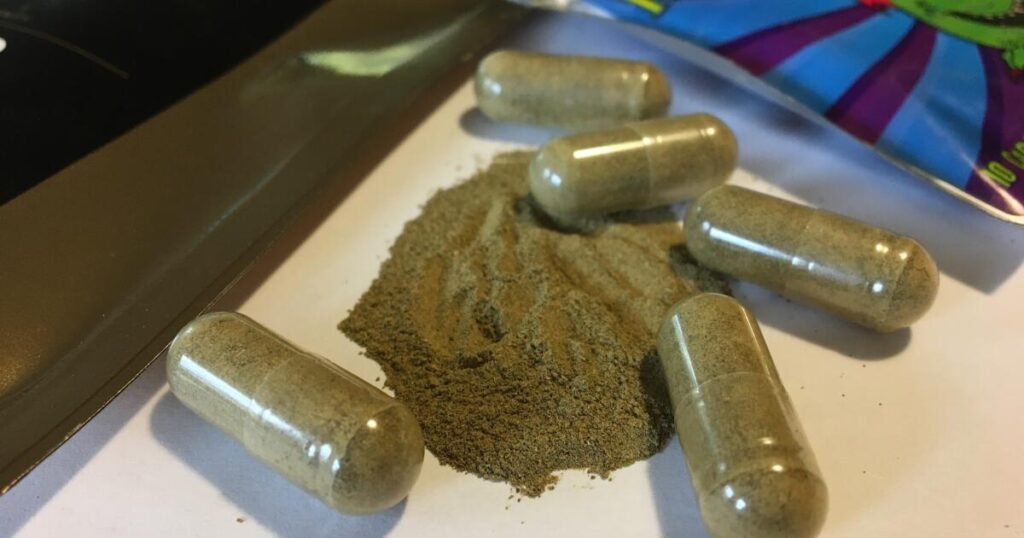Recently, the Los Angeles County Public Health Department reported it had linked the deaths of six L.A. County residents over the last spring and summer to the use of kratom, a widely available but unregulated supplement sold as a remedy for all sorts of health issues.
The deaths prompted public health officials to announce Nov. 7 that they would red-tag and pull from store shelves all products containing either kratom or the synthetic alkaloid 7-Hydroxymitragynine, also known as 7-OH, which is derived from kratom. Both are currently unregulated and not approved for use in the United States or the state of California as a drug product, dietary supplement or an approved food additive, according to the U.S. Food and Drug Administration.
Unsurprisingly, business owners who sell kratom feel that the health department has overstepped, going too far without understanding how the supplement is helping many L.A. residents. The deaths, they say, are not necessarily due to kratom products, but to interactions with other substances.
Perhaps more important are the benefits that kratom users and some experts claim the drug provides. Many say the problem is with 7-OH — a highly concentrated, synthetic version of natural kratom that is subject to adulteration and fraudulent marketing — and that banning the sale of all kratom products could create an even more dangerous underground market of both kratom and 7-OH.
Indeed, many kratom sellers and users would welcome better regulation, so that they could continue to use the affordable, widely available substance as a way to treat physical pain and mental health issues with more confidence in the efficacy and safety of the products they are selling and buying.
During the months of April and July, a total of six L.A. County adults between the ages of 19 and 39 died with kratom and 7-OH in their bodies, along with other substances including alcohol, prescription sedatives and muscle relaxers, and cocaine.
In the medical examiner’s reports, the cause of death for five of the deceased was listed as a consequence of “mixed drug effects”; the sixth was listed as being caused by an overdose of cocaine.
The Times spoke with three different toxicologists to review these coroner’s reports and get a better understanding of what role kratom or 7-OH may have had in the deaths.
What the experts told The Times is that while toxicologists have an understanding of the possible effect that kratom alone can have on the body, the picture becomes unclear when other drugs are introduced.
Kratom is an herbal extract made from the leaves of Mitragyna speciosa, a tree native to Southeast Asia. It is sold in smoke shops and online in a variety of forms including powders, pills and liquid extracts.
At low doses, kratom causes a stimulant effect with users reporting an uptick in energy. At high doses it creates a sedative effect, said Donna Papsun, a forensic toxicologist with NMS Labs.
Researchers say a majority of kratom users consume the plant to relieve pain. In some cases, people report using it effectively to treat opioid dependence. Others use it to alleviate mental health challenges such as anxiety and depression.
In the last few years, a synthetic version of kratom refined to its psychoactive compound 7-Hydroxymitragynine, or 7-OH, has grown in popularity. The much more potent form of the largely unregulated drug has become a concern for public health officials and advocates.
But toxicologists say there isn’t enough research to provide a comprehensive understanding of what concentrations of kratom or 7-OH can be acutely toxic in the body when alone.
It’s likely they can also cause dangerous reactions when combined with other drugs that could amplify their effects, experts said, but the lack of research means doctors just don’t know what they are. That’s where the most concerning risks lie, said Craig Smollin, medical director of the San Francisco division of the California Poison Control System.
In cases where kratom and 7-OH are found in the bodies of a recent accidental death, typically toxicologists have found evidence of polysubstance use — when two or more drugs are taken together either intentionally or unintentionally.
“I don’t claim to have investigated all the reports about kratom deaths, but I haven’t seen too many reports of single-drug ingestions of kratom causing death,” Smollin said.
And while there’s an effective method to test for the quantity of kratom in the body, there isn’t a similarly accurate test for 7-OH. Current tests can only say whether or not it is present. In all six L.A. County deaths, it was.
But, Papsun notes, when kratom is metabolized in the body, part of the breakdown includes 7-OH, which means it will likely show up in medical exams whenever kratom does.
Toxicology labs face significant challenges when trying to quickly develop tests for emerging drugs like 7-OH for use in post-mortem medical examinations, Papsun said. “Adding something to a scope of testing is not easy from a forensic point of view because you have to develop it, validate the test, have available commercial material and it has to be scientifically rigorous because these results can end up in court,” Papsun said.
A further challenge to testing for 7-OH, specifically, is that the compound is “incredibly unstable,” she said. It can be detected in the body at the time of death but by the time the sample is collected and tested, the compound may have started to break down already, leading to inaccurate results.
Robert Powers, a forensic toxicologist at the University of New Haven, agreed that it was difficult to tell whether kratom and 7-OH played a direct role in the L.A. County deaths. “Most of the problems that arise with this drug are in combination with other respiratory depressant type drugs: opiates, benzodiazepines, alcohol,” he said, though he added that the deaths are “not an easy picture” to understand.
That’s why, he said, the L.A. County health department’s move to pull these products off the shelves makes sense. “I think it’s reasonable to recognize that in these cases, kratom could have indeed played a contributory role. And I understand the interest in trying to limit the potential effects of this drug in those mixed cases, so I understand why people would be interested in controlling this drug.”
Smollin, the San Francisco poison center director, concurred, pointing out how much the county still might not know about kratom and 7-OH.
That lack of information trickles down to consumers, who often rely on guidance from local, state and federal agencies about the risks of products like kratom and 7-OH.
Indeed, Dee Mascalusco, 74, said she’s had to take it upon herself to seek out other sources of guidance, and experiment with different amounts of daily dosage to alleviate her symptoms of fatigue and trouble breathing from years of chronic lung illnesses.
When she learned of the county’s decision, “it scared me to death that they were going to pull” kratom products. “I told my husband, I don’t know what I’m going to do if I don’t have it and then I won’t be able to get out of bed, or paint or do the little bit that I can do,” she said.
Mascalusco was an actor and comedian who in her 60s lived in Park City, Utah, but more recently moved to L.A. when her health declined due to pneumonia that progressed to debilitating infections in her lungs.
Mascalusco used to have an active lifestyle, but the damage to her lungs made it so she could barely go up and down the stairs of her Utah home without feeling winded. She also felt the elevation in Park City was straining her health — it’s one reason she chose to move to Los Angeles, which is mostly low-altitude.
She saw a number of specialists, but none offered any options that helped alleviate her symptoms. Then, she stumbled on a documentary that highlighted the benefits of kratom in regards to chronic pain and mental health. She decided to try it.
“I didn’t use it very often, but when I did I found that it helped so many of my issues,” Mascalusco said.
She described the effect as a boost of energy that in turn gave her the motivation and strength to get out of bed. “This was much more of a subtle feeling of just relief from being in a state of someone who is unwell and tired,” Mascalusco said. “I loved it and I still use it.”
As her illness has progressed, Mascalusco has continued to rely on kratom whenever she knows she’ll have a long day or has to attend a function and be sociable.
“It made me feel like my old self — smart mouth, funny and quick. I was a stand-up comic, I did all these things and I was becoming this old tired lady that got winded going up a few stairs and it pissed me off,” she said.
Mascalusco doesn’t advocate for 7-OH but she doesn’t want kratom to be banned; she’d rather it be regulated and available to the public.
“I think the government should give us the leeway to educate ourselves,” she said. ”There’s always going to be people that misuse it but I don’t think that those of us who are using it responsibly and getting benefit from it should be penalized.”
Business owners like Abdullah Mamun, who started the company Authentic Kratom 12 years ago, agree with Mascalusco’s perspective.
Authentic Kratom began as an e-commerce business based in Canoga Park, and has since grown into three brick-and-mortar locations in Canoga Park, Woodland Hills and Hollywood.
Mamun believes 7-OH is a real risk, and that L.A. County should focus its efforts there. A blanket ban on all kratom products, however, is counterproductive, he said. First of all, based on what his customers have told him over the past decade or so, he believes “kratom doesn’t cure you, but it gives people the relief that they’re looking for and the ability to manage their pain.” Second, red-tagging kratom products would directly affect his Authentic Kratom and the livelihood of his seven full-time employees.
And he welcomes regulation on kratom products.
“We want them to be properly labeled for customers because people should know what they’re putting in their body,” he said.
The post Kratom was linked to 6 L.A. deaths and banned in the county. But the supplement’s actual health risks remain a mystery appeared first on Los Angeles Times.




